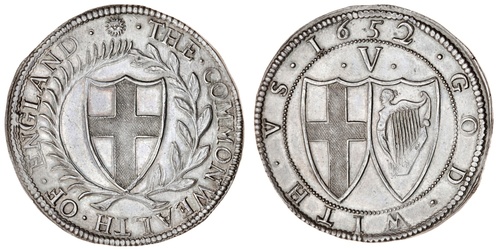
Auction: 19021 - The Dr. Erik Miller Collection Part I - Crowns
Lot: 21
Commonwealth (1649-1660), Crown, 1652, 'large 2', m.m. sun,
Whetmore, 14 July 1961, lot 50 - "extremely fine specimen, one of the best-known and very rare" - £125.0.0 (Miller)
Webb, 9-14 July 1894, lot 620 - "a most perfect and brilliant specimen" - £6.15.0 (Lincoln)
Neck, collection acquired by Webb, c. 1884, and dispersed in his sale
The present cataloguer has traced several 19th Century listings for 1652 Crowns that offer a potential provenance prior to the Neck cabinet. On the basis that he ceased collecting in 1884 owing to bankruptcy, several examples can be readily discounted, including the Wigan coin (sold 1872), having passed to Brice (sold 1887); Montagu, third duplicates (1888, lot 387); Richardson (1895, lot 256); and Thorburn (1918) before entering the cabinet of Lt. Col T G Taylor and eventual dispersal via the Spink Numismatic Circular in May 1931. Similarly the Durrant specimen (1847), described as "highly preserved", and probably the same as that once found in the cabinet of Abraham Edmonds (1834, lot 208 - to Young), can also be discounted, given its unbroken passage through the collections of Duncombe (1869), Addington (sold 1883); Montagu, first duplicates (1883, lot 116); Moon (1901, lot 263); and Roth (1917, lot 336). Finally, the Halliburton-Young coin (1881, lot 288), that passed directly from sale to Egmont-Bieber (1889, lot 222); and then Westerman (1891, lot 80) can equally be dismissed.
However the Cuff coin (1854, lot 1254), described as "in the most splendid state of preservation", passed via Cureton to Captain Murchison, at whose sale in 1864 (lot 352), it was listed with Cuff's provenance, as well as that of the as yet untraced 'Meymott' collection, which according to later catalogues was also the source for Cuff's 1649 Crown, see pp 32). Purchased by the dealer George Eastwood, it did not feature in his posthumous stock sales of 1866 and 1867, and as such remains untraced. Juxtaposed with Neck's period of acquisition, and in the absence of further evidence, one could therefore tentatively associate the present example with the Murchison and Cuff cabinets.
Subject to 20% VAT on Buyer’s Premium. For more information please view Terms and Conditions for Buyers.
Sold for
£32,000




